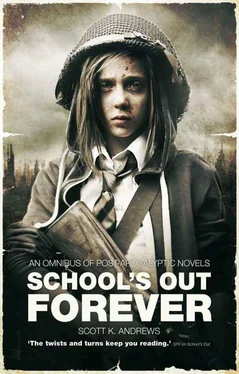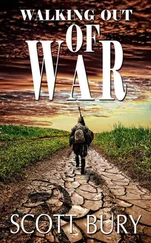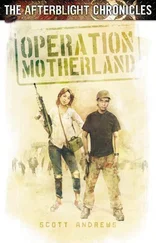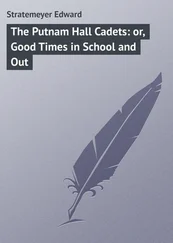The woman barrelled on through the darkness, turning the corner at the far end to find a dead end and an old metal grille in the floor. It was still open, and the glow of the receding torch seeped out of it. She did not even look down into the sewers before jumping.
She splashed into cold, lumpy water that came up to her waist. The sewer was a round tube of Victorian brick. The current was strong, swollen by the heavy rains, and the water swirled and eddied, trying to pull her feet out from under her. The floor felt slimy beneath her feet and she knew that if she lost her footing she would be in big trouble.
She held the gun high above her head and waded forward, following the fading light around the curve of the tunnel.
She had only progressed a few metres when she stepped into space, a breach in the sewer floor, like a pothole. She unbalanced and fell backwards, disappearing into the raging torrent and being carried forward at speed. She lost her grip on the gun. Flailing around in the darkness, she broke the surface once, twice, gasping for air as she hurtled along.
For the first time it occurred to her that she might die down here.
She lost all sense of orientation. Down was up, left was right. The water roared in her ears, she saw flashes behind her closed eyes and felt the dizziness of impending unconsciousness.
Then she hit something. Something soft, which fell ahead of her, and then she and this object were tumbling together in the water. Something hard hit her on the side of the head; was that the torch or her gun? Just as she thought she was dead, the water threw her out into a void and she fell, momentarily free, drawing ragged, desperate breaths.
She splashed down into a lake of some sort and fought to the surface. There was no light down here. The torch had gone. She floated there, treading water as it swirled around her, calming herself, listening intently, trying to filter out the sound of the waterfall that had deposited her in what she assumed was some sort of junction.
She had not fallen down into this pit alone. The person she had collided with must be here too, somewhere in the darkness.
“Spider,” she shouted. Her voice echoed back to her a hundred times. This chamber was big and arched. “Spider!”
She waited, feeling the fatigue in her legs as they kicked against the tide.
“Miss Booker, you surprise me,” came the reply at last, his too calm voice seeming to come at her from every direction.
She turned left and right, trying to get a bearing on the bastard. It was no use; he could have been anywhere.
“If I could see you, I would shoot you,” he said, seeming more in control. Had he made it out of the water on to some ledge? He didn’t sound like he was swimming any more. “But I suppose I will have to settle for leaving you here to drown. Goodbye, Kate.”
‘Kate,’ thought the woman. ‘Who’s Kate?’
“I’ll find you,” she screamed. “No matter where you fucking hide, I’ll find you.”
“No,” came the reply, fainter now, moving away. “I will find you, if you survive the day. Trust me.”
“Spider?” she yelled. “Spider!”
But there was no reply, only darkness and water and white noise.
A COUNCIL WORKER found the woman later that night, unconscious, half dead, suffering from hypothermia, washed up on a brick shore half a mile under the city. Her body was swarming with rats. When he managed to wake her, she couldn’t tell him her name. Delirious, she muttered incoherently about webs as he radioed for assistance.
TWO MONTHS LATER, a nondescript car drove through a pair of wrought iron gates and down the driveway of a minor public school in Kent. It parked behind the main building and two people, a man and a woman, got out.
He wore a smile that spoke of familiarity and nostalgia. Her face betrayed no emotion at all.
“This way,” he said, and walked towards the rear doors, his feet crunching on the gravel.
She did not follow him immediately, pausing to take in her surroundings. The sports fields stretched away ahead of her, bordered on all sides by thick woods, lush green in the summer heat. The sky was blue and the air was clear and smelt of pine needles and fresh water. The only sound came from the soft rustle of the leaves in the gentle wind.
“You coming?”
She turned and trailed after the man, who pushed open the door and entered.
The building was impressive and old, but not as old as some public schools. This was a Victorian edifice, imposing and solid. The inside reflected this, with dark wood panelled walls, tiled floors and portraits of illustrious benefactors with big sideburns hanging on the whitewashed walls.
The man led her deep into the silent building, up a small back staircase once meant for servants, to a small door in the east wing. He opened the door then handed her the keys.
“Welcome home,” he said.
“It’s not my home, John.”
“It is now,” said DI Cooper. Then he added, smiling: “Matron.”
The woman slapped him playfully on the arm and allowed herself the tiniest grin as she stepped over the threshold into the flat. It was pokey but cosy. An small open fireplace sat in the middle of the far wall, with a flower print sofa and chair in front of it. There was a dresser, a bathroom with an old enamelled bath, a kitchen that barely had standing room for one and a bedroom with a single bed and wardrobe. The woman sighed and walked over to the living room window. The view of the fields and woods, with the thin skein of the river glinting on the horizon, was beautiful. This was a good place; quiet and peaceful, isolated from reality. The outside world would not bother her here.
“Yeah, it’ll do,” she said eventually, heartened by the green and the sun. It was hard to feel too low on such a gorgeous day. But she knew that looking out of this window on a cold, grey winter’s day would be a very different prospect.
She heard a click from the kitchen and the rumble as the kettle began boiling. She stayed at the window until the man tapped her on the shoulder and handed her a mug of strong hot tea. She thanked him and sat on the sofa. He sat opposite, on the armchair, sipping his own brew.
“So this is where you went to school, huh?” she said.
“Yeah. I’m on the alumni committee and everything.”
“I thought places like this only turned out lawyers and bankers.”
“Oh, no, soldiers too. There’s a cadet force here.”
“Seriously?”
“Once a week they dress the boys up in uniforms and teach them to shoot things.”
A flash of unease passed across the woman’s face.
“Don’t worry,” said the man. “Matrons are exempt. You won’t ever have to hold a gun again, Kate.”
After a short pause she said: “It’s Jane, remember? I’m supposed to be Jane now.”
“Sorry, I know. But not forever. Once we catch the bastard you can go back to being Kate again.”
The woman did not correct his misapprehension.
“The boys arrive tomorrow,” he continued. “Then you’ll be up to your elbows in Clearasil, TCP and black eyes.”
“Can’t wait.” Another pause, and then: “Do you have any idea where he is?”
The man shook his head. “If I had to guess, Serbia.”
The woman nodded.
“Were there any biscuits in there?” she asked. “I fancy dunking.”
WHEN COOPER HAD gone, the woman drew a bath and gently lowered herself into the near boiling water, letting her skin adjust to the heat in tiny increments, her lips pursed with the pleasure of pain.
She floated, weightless, closed her eyes and concentrated on her breathing. She took long, slow, deep breaths and pictured the cares and stresses of her day dissolving out of her into the bathwater.
Читать дальше












